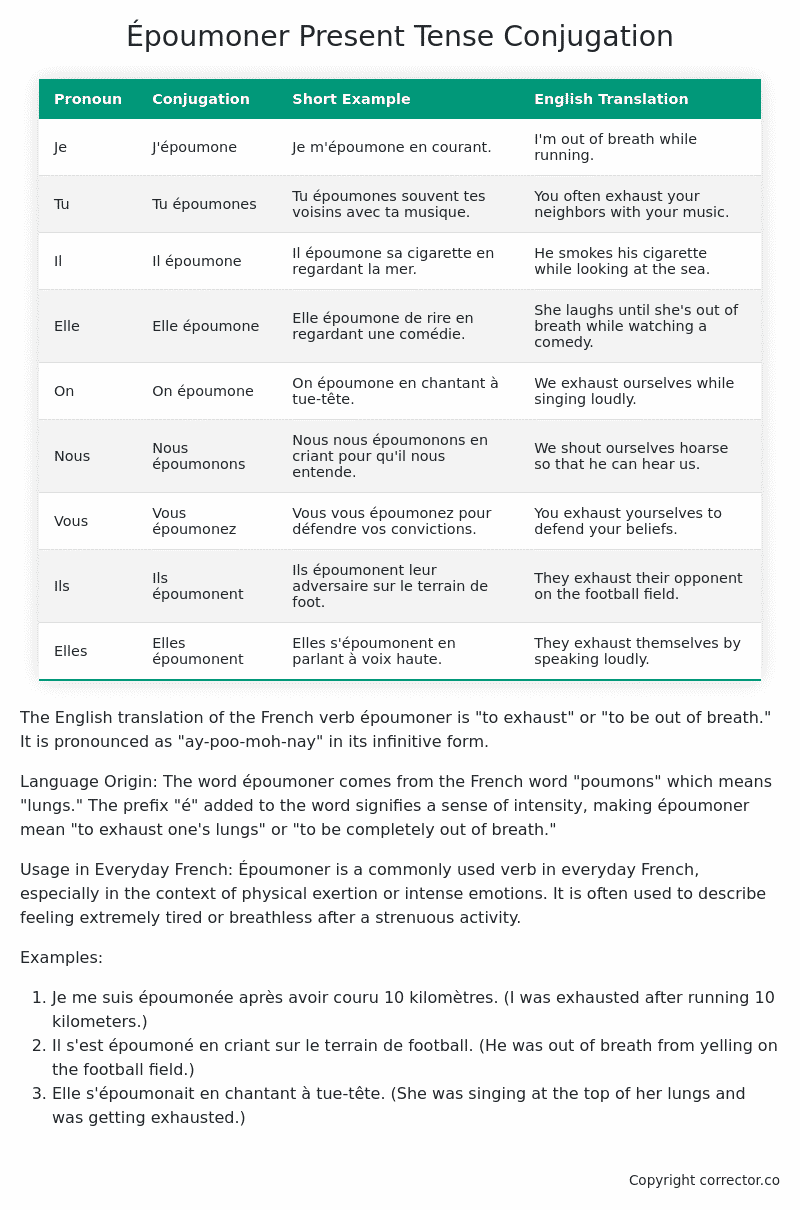Le Present (Present Tense) Conjugation of the French Verb époumoner
Introduction to the verb époumoner
The English translation of the French verb époumoner is “to exhaust” or “to be out of breath.” It is pronounced as “ay-poo-moh-nay” in its infinitive form.
Language Origin:
The word époumoner comes from the French word “poumons” which means “lungs.” The prefix “é” added to the word signifies a sense of intensity, making époumoner mean “to exhaust one’s lungs” or “to be completely out of breath.”
Usage in Everyday French:
Époumoner is a commonly used verb in everyday French, especially in the context of physical exertion or intense emotions. It is often used to describe feeling extremely tired or breathless after a strenuous activity.
Examples:
- Je me suis époumonée après avoir couru 10 kilomètres. (I was exhausted after running 10 kilometers.)
- Il s’est époumoné en criant sur le terrain de football. (He was out of breath from yelling on the football field.)
- Elle s’époumonait en chantant à tue-tête. (She was singing at the top of her lungs and was getting exhausted.)
Époumoner – About the French Present Tense
To take a deep dive into all the French tenses then see our article on Mastering French Tense Conjugation.
Common Everyday Usage Patterns For Le Present
Interactions with Other Tenses
Table of the Present Tense Conjugation of époumoner
| Pronoun | Conjugation | Short Example | English Translation |
|---|---|---|---|
| Je | J’époumone | Je m’époumone en courant. | I’m out of breath while running. |
| Tu | Tu époumones | Tu époumones souvent tes voisins avec ta musique. | You often exhaust your neighbors with your music. |
| Il | Il époumone | Il époumone sa cigarette en regardant la mer. | He smokes his cigarette while looking at the sea. |
| Elle | Elle époumone | Elle époumone de rire en regardant une comédie. | She laughs until she’s out of breath while watching a comedy. |
| On | On époumone | On époumone en chantant à tue-tête. | We exhaust ourselves while singing loudly. |
| Nous | Nous époumonons | Nous nous époumonons en criant pour qu’il nous entende. | We shout ourselves hoarse so that he can hear us. |
| Vous | Vous époumonez | Vous vous époumonez pour défendre vos convictions. | You exhaust yourselves to defend your beliefs. |
| Ils | Ils époumonent | Ils époumonent leur adversaire sur le terrain de foot. | They exhaust their opponent on the football field. |
| Elles | Elles époumonent | Elles s’époumonent en parlant à voix haute. | They exhaust themselves by speaking loudly. |
Other Conjugations for Époumoner.
Le Present (Present Tense) Conjugation of the French Verb époumoner (this article)
Imparfait (Imperfect) Tense Conjugation of the French Verb époumoner
Passé Simple (Simple Past) Tense Conjugation of the French Verb époumoner
Passé Composé (Present Perfect) Tense Conjugation of the French Verb époumoner
Futur Simple (Simple Future) Tense Conjugation of the French Verb époumoner
Futur Proche (Near Future) Tense Conjugation of the French Verb époumoner
Plus-que-parfait (Pluperfect) Tense Conjugation of the French Verb époumoner
Passé Antérieur (Past Anterior) Tense Conjugation of the French Verb époumoner
Futur Antérieur (Future Anterior) Tense Conjugation of the French Verb époumoner
Subjonctif Présent (Subjunctive Present) Tense Conjugation of the French Verb époumoner
Subjonctif Passé (Subjunctive Past) Tense Conjugation of the French Verb époumoner
Subjonctif Imparfait (Subjunctive Imperfect) Tense Conjugation of the French Verb époumoner
Subjonctif Plus-que-parfait (Subjunctive Pluperfect) Tense Conjugation of the French Verb époumoner
Conditionnel Présent (Conditional Present) Tense Conjugation of the French Verb époumoner
Conditionnel Passé (Conditional Past) Tense Conjugation of the French Verb époumoner
L’impératif Présent (Imperative Present) Tense Conjugation of the French Verb époumoner
L’infinitif Présent (Infinitive Present) Tense Conjugation of the French Verb époumoner
Struggling with French verbs or the language in general? Why not use our free French Grammar Checker – no registration required!
Get a FREE Download Study Sheet of this Conjugation 🔥
Simply right click the image below, click “save image” and get your free reference for the époumoner Present Tense tense conjugation!

I hope you enjoyed this article on the verb époumoner. Still in a learning mood? Check out another TOTALLY random French verb present conjugation!


